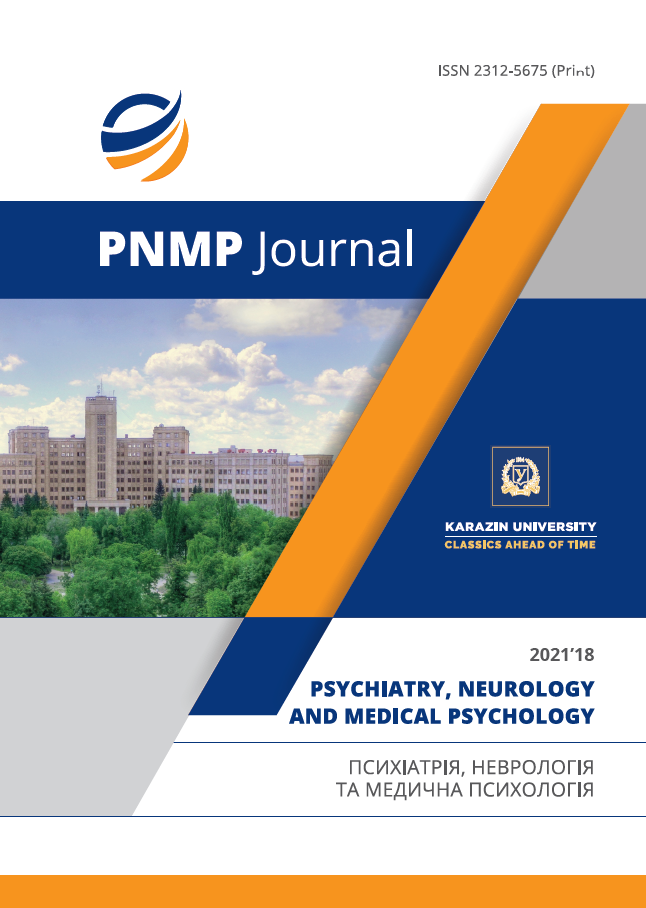Level of compliance of patients with alcohol dependence at the stages of active treatment of alcohol misuse
Abstract
The article shows that one of the causes of relapses and re-hospitalizations is low compliance of patients, or non-compliance with their therapeutic regimen, especially at the end of anti-alcohol treatment. The author has developed some definitions, which specify the specifics of the phenomenon of compliance with patients with alcohol dependence; its levels in this group of patients were determined. Social and clinical-psychological factors that contribute to or hinder the formation of compliance are identified. Factors that increase compliance include: the presence of family support; motives for alcohol consumption, which are associated with the desire to neutralize negative emotional experiences (fear, anxiety, insecurity); therapeutic attitudes to understand the hidden causes of the disease and change painful stereotypes of behavior; ergopathic type of attitude to the disease; high level of subjective control in the professional field; emotional stability, social activity, as well as practicality and the ability to adequately assess their condition. Factors that reduce compliance are: young age of the patient; frequent relapses; repeated hospitalizations; addictive motivation to drink alcohol; therapeutic facilities for obtaining a "secondary gain" from the disease; apathetic type of attitude to the disease; overall low level of subjective control; conflict, negligence, rigidity of thinking. The selected psychological factors of compliance with alcohol dependence can be considered as targets of psychoprophylactic and psychocorrectional programs aimed at optimizing the process of adherence to the therapeutic regimen of patients with this pathology, which, in turn, will help prevent relapses and maintain remissions. This work is based on the results of the experience of psychodiagnostic and psychocorrectional work with alcohol-dependent patients who were under observation in the clinical databases of the Institute of Neurology, Psychiatry and Addiction of the Academy of Medical Sciences of Ukraine.
Downloads
References
Gaponov K.D. Features of clinical arrangement of alcohol dependence in people with different levels of psychosocial stress. Psychiatry, neurology and medical psychology. 2018. No. 1 (9), pp. 43–54. https://doi.org/10.26565/2312-5675-2018-9-06
Clinical psychology: a textbook Edited by BD Karvasarsky. 2007. 960 p.
Minko O.I., Lisna N.M., Markozova L.M. Individual psychological characteristics of people with alcohol dependence and their interdependent relatives, which influence the formation of a therapeutic alliance. Ukrainian Bulletin of Psychoneurology. 2018. No. 3 (96), pp. 39-42.
Lapach S.N., Chubenko A.V., Babich P.N. Statistical methods in biomedical research using Excel. Kyiv: Morion, 2001. 408 p.
Lisna N.M. Psychological interventions aimed at reducing alcohol consumption are recommended by modern clinical guidelines (review of foreign publications). Psychiatry, neurology and medical psychology. 2020. No. 15, pp. 88-94. https://doi.org/10.26565/2312-5675-2020-15-10
Lisna N.M. Study of the level and type of compliance of patients with alcohol dependence. Author's certificate № 21140, dated July 6, 2007.
Lisna N.M. Types of compliance of patients with alcohol dependence. Bulletin of Kharkiv National University. V.N. Karazina. Psychology. 2007. No. 771, pp. 35-41.
Sosin I.K. Evidence-based pharmacy: modern rubrication of indications for the use of laser therapy in narcology. Ukrainian Bulletin of Psychoneurology. 2012. No. 2, pp. 90–91.
Raigorodsky D.Ya. Practical psychodiagnostics. Methods and tests. Tutorial. "BAHRAH-M". 2001. 664 p.
Shestopalova L.F., Lisna N.M. Compliance of people with alcohol dependence: a monograph. Kh.: VN KhNU Karazina. 2012. 156 p.

